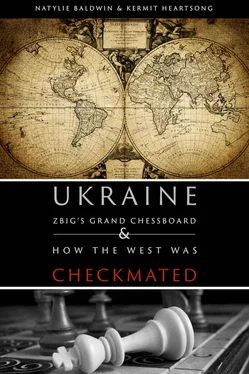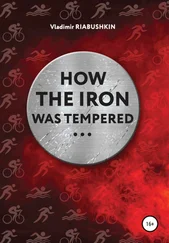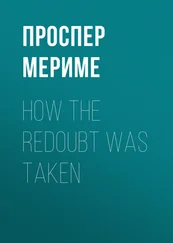Kermit Heartsong - Ukraine - ZBIG's Grand Chess Board & How The West Was Checkmated
Здесь есть возможность читать онлайн «Kermit Heartsong - Ukraine - ZBIG's Grand Chess Board & How The West Was Checkmated» весь текст электронной книги совершенно бесплатно (целиком полную версию без сокращений). В некоторых случаях можно слушать аудио, скачать через торрент в формате fb2 и присутствует краткое содержание. Год выпуска: 2015, Жанр: Политика, на английском языке. Описание произведения, (предисловие) а так же отзывы посетителей доступны на портале библиотеки ЛибКат.
- Название:Ukraine: ZBIG's Grand Chess Board & How The West Was Checkmated
- Автор:
- Жанр:
- Год:2015
- ISBN:нет данных
- Рейтинг книги:4 / 5. Голосов: 1
-
Избранное:Добавить в избранное
- Отзывы:
-
Ваша оценка:
- 80
- 1
- 2
- 3
- 4
- 5
Ukraine: ZBIG's Grand Chess Board & How The West Was Checkmated: краткое содержание, описание и аннотация
Предлагаем к чтению аннотацию, описание, краткое содержание или предисловие (зависит от того, что написал сам автор книги «Ukraine: ZBIG's Grand Chess Board & How The West Was Checkmated»). Если вы не нашли необходимую информацию о книге — напишите в комментариях, мы постараемся отыскать её.
Ukraine: ZBIG's Grand Chess Board & How The West Was Checkmated — читать онлайн бесплатно полную книгу (весь текст) целиком
Ниже представлен текст книги, разбитый по страницам. Система сохранения места последней прочитанной страницы, позволяет с удобством читать онлайн бесплатно книгу «Ukraine: ZBIG's Grand Chess Board & How The West Was Checkmated», без необходимости каждый раз заново искать на чём Вы остановились. Поставьте закладку, и сможете в любой момент перейти на страницу, на которой закончили чтение.
Интервал:
Закладка:
Russians are little impressed with American assurances that it reflects no hostile intentions. They would see their prestige (always uppermost in the Russian mind) and their security interests as adversely affected.
— George F. Kennan, author of US “containment” policy for the Soviet Union (Kennan 1997)
They probably rubbed their hands rejoicing at having played a trick on the Russians.
— Mikhail Gorbachev in a 2009 interview with Germany's Bild newspaper on the West's broken promise not to extend NATO east in return for German reunification (RIA Novosti 2009)
In December of 1989, a few weeks after the fall of the Berlin Wall, President George H.W. Bush (Bush I) participated in a summit with Mikhail Gorbachev in Malta. During that summit, Washington promised that it would not “take advantage” of the political upheaval taking place in Eastern Europe in light of Gorbachev's decision not to use force to maintain control in the region (McGovern 2015).
Subsequently, on February 9, 1990, Bush’s Secretary of State James Baker negotiated a gentleman's agreement with Gorbachev that, in exchange for allowing a reunified Germany as a NATO member, NATO would not be expanded any farther east. The following day, West German Chancellor Helmut Kohl reiterated this same offer, which is when Gorbachev actually accepted it. Due to the Soviet Union’s history of having been invaded twice by Germany during the 20th century, Gorbachev was understandably hesitant to allow reunification. However, Baker had explained that it would be better to have a unified Germany in NATO, where it was implied that any contemplated military actions would be kept in check, than to have an independent Germany. Gorbachev ultimately agreed with this reasoning but made a grave error in not demanding that the agreement be put in writing, which has provided US leaders with plausible deniability when it suited them (Sarotte 2010).
According to ex-CIA analyst and Soviet specialist Ray McGovern, when he first asked Viktor Borisovich Kuvaldin, one of Gorbachev's advisers at the time, why there was no written record of Baker's promises insisted upon, McGovern described Kuvaldin's response as follows:
He tilted his head, looked me straight in the eye, and said, “We trusted you.” (McGovern 2015)
NATO Secretary General Manfred Woerner reflected Gorbachev's understanding of the agreement in a speech three months later in Brussels where he stated, “the fact that we are ready not to place a NATO army outside of German territory gives the Soviet Union a firm security guarantee” (Pushkov 2007).
That “firm security guarantee” has translated into a total of twelve new members, all from Central and Eastern Europe, that have joined NATO since the end of the Cold War, with overtures having also been made toward Kazakhstan and Azerbaijan (Nazemroaya 2012).
The agreement was first broken by President Bill Clinton who encouraged the entry of Hungary, Poland, and the Czech Republic into the alliance. This followed both an intensive lobbying effort by the arms industry, which needed a mission to justify its continued share of public largesse after the Cold War, and a political battle between Clinton and Bob Dole for the Polish-American vote during that year’s presidential campaign (Hartung 1998; Chicago Tribune 1996). Later, Bush II actively lobbied for the entry of seven more Eastern European nations into the alliance, including the three Baltic states of Estonia, Latvia and Lithuania on Russia's border (Matlock 2010).
Jack Matlock, who served as US ambassador to the Soviet Union in the Bush I administration, explains that when Clinton was advised by Russian representatives and Soviet/Russia experts, even some of whom had participated in the negotiated end of the Cold War, that he was about to make a serious geopolitical blunder in encouraging NATO expansion, he did it anyway.
“[One of two decisions] turned Russian public opinion during the years of the Clinton administration from strongly pro-American to vigorous opposition to American policies abroad. The first was the decision to extend the NATO military structure into countries that had previously been members of the Warsaw Pact. There was no need to expand NATO to ensure the security of the newly independent countries of Eastern Europe. There were other ways those countries could have been reassured and protected without seeming to re-divide Europe to Russia’s disadvantage…Combined with rhetoric claiming “victory” in the Cold War, expanding NATO suggested to the Russian public that throwing off communism and breaking up the Soviet Union had probably been a bad idea. Instead of getting credit for voluntarily joining the West, they were being treated as if they had been defeated and were not worthy to be allies.” (Matlock 2010)
The obvious question to ask is why we needed to keep NATO if the reason for its existence had disappeared and the Warsaw Pact, its Soviet-era counterpart, had been disbanded? Alexey Pushkov, Russian legislator and Professor at the Moscow State Institute of International Relations, recalls that this question was indeed put to the West over the years: “The standard response to the arguments against NATO's eastward expansion was that Russia's neighbors felt unsafe. [But] neither Warsaw nor Prague could point to any signs that Russia had aggressive designs towards Eastern Europe” (Pushkov 2007).
Pushkov states that proposals were offered to guarantee security for the countries of Eastern Europe that did not require the expansion of NATO, as Matlock suggests above, but such offers were rejected in Washington and Brussels. He goes on to describe his experiences over the years in trying to explain Russia's concerns about NATO expansion to the West:
Throughout the 1990s, I often made the point that by expanding NATO eastward, Russia would be pushed out of the Euro-Atlantic community. From the geopolitical point of view it is as if the West were saying to Russia, “From now on, your security is of no interest to us. You are on your own.” The answers I was repeatedly getting were amazing and extremely short-sighted: “What can you do to oppose the expansion? Move your troops to your Western borders? What practical measures can you take?” As for the guarantees given in 1989 and 1990, I was told that none of them had been codified in any formal treaty or agreement and that, even if Western leaders such as Helmut Kohl or John Major reiterated what Baker or Woerner had said, they were now of no consequence.” (Pushkov 2007)
Despite warm personal relations between Bush II and Putin at the start of the new millennium, Russia's security concerns ultimately did not fare any better with the new administration.
After the September 11th attacks, Putin was the first world leader to call Bush, seeing it as an opening for cooperation (Matlock 2010). After supporting the US War on Terrorism, including logistical and intelligence assistance, as well as providing access for what were to be temporary military bases to conduct the war in Afghanistan — a decision Putin had to persuade nay-sayers among his defense and security chiefs to agree to — Putin undoubtedly thought there would be some meaningful reciprocity. However, he eventually realized that little would be forthcoming (Roxburgh 2013).
In October of 2001, Putin met NATO Secretary General George Robertson in Brussels and boldly inquired as to when Russia would be invited to join NATO. Robertson told him that he'd have to apply for membership, go through a vetting process, and then an invitation would be issued (Roxburgh 2013). Putin shrugged this off with a dismissive comment to the effect that Russia would not wait in line with smaller, less important countries (Roxburgh 2013).
As a way to placate Russia, British Prime Minister Tony Blair came up with a plan in 2002 to create the NATO — Russia Council, a measure “stopping well short of membership but at least giving them a sense of belonging to the club.” Russia would have a permanent ambassador to NATO and would participate in NATO discussions. But problems soon arose, including complaints from Russia that they were often excluded from informal discussions prior to official meetings and would consequently face a coordinated bloc. These effects, combined with Blair's underlying attitude in creating the plan — as stated by one of his aides (Roxburgh 2013), that “even if they [Russia] weren't really a superpower anymore, you had to pretend they were,” created the impression that the West was merely being condescending. This is particularly striking when one reads Putin's words at the signing ceremony about his desire for Russia's needs to be heard and to be respected:
Читать дальшеИнтервал:
Закладка:
Похожие книги на «Ukraine: ZBIG's Grand Chess Board & How The West Was Checkmated»
Представляем Вашему вниманию похожие книги на «Ukraine: ZBIG's Grand Chess Board & How The West Was Checkmated» списком для выбора. Мы отобрали схожую по названию и смыслу литературу в надежде предоставить читателям больше вариантов отыскать новые, интересные, ещё непрочитанные произведения.
Обсуждение, отзывы о книге «Ukraine: ZBIG's Grand Chess Board & How The West Was Checkmated» и просто собственные мнения читателей. Оставьте ваши комментарии, напишите, что Вы думаете о произведении, его смысле или главных героях. Укажите что конкретно понравилось, а что нет, и почему Вы так считаете.











